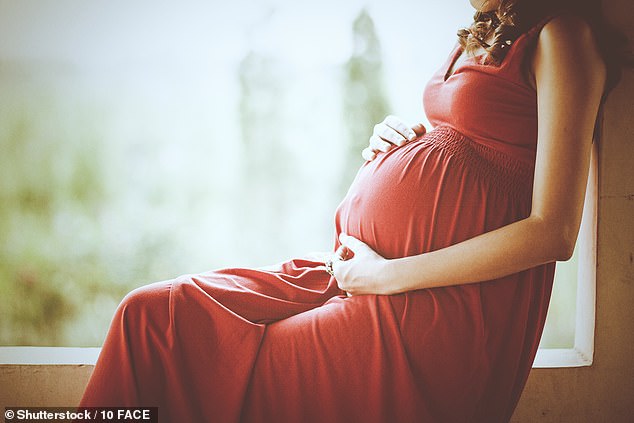Research shows that half of women have a traumatic birth, which delays having more children
More than half of women who experience trauma during childbirth delay having more children.
A snapshot of a thousand members of the Mumsnet website showed that 79 percent of respondents had experienced birth trauma.
Women can develop birth trauma after experiences such as an unplanned caesarean section, emergency treatment or a difficult birth with a long and painful labor.
Nearly two-thirds of mothers who experienced birth trauma said they felt a “lack of compassion” from healthcare providers during childbirth, while 44 percent said language was used that implied they were “a failure or to blame” for their experience.
About 53 percent said the experience put them off having more babies.
Women can develop birth trauma after experiences such as an unplanned caesarean section, emergency treatment or a difficult birth with a long and painful labor (Stock Image)

Nearly two-thirds of mothers who experienced birth trauma said they felt a “lack of compassion” from healthcare providers during childbirth, while 44 percent said language was used that implied they were “a failure or to blame” for their experience (Stock Image)
Nearly two-thirds of people surveyed by Mumsnet did not believe health professionals were doing everything they could to prevent birth trauma.
Stafford MP Theo Clarke, who has spoken out about her own traumatic birth where she thought she was ‘going to die’ after suffering a third-degree laceration and needing emergency surgery, has called for action.
The Conservative MP said: ‘These research findings are deeply disturbing.
‘They speak of my own experience of birth trauma and clearly the terrible experiences of many, many other women.
‘The research makes it clear that more compassion, education and better aftercare for mothers suffering from birth trauma are desperately needed if we want to see an improvement in the physical well-being and mental health of mothers.
‘
Mumsnet chief executive Justine Roberts said: ‘We hear every day on Mumsnet from women who have had deeply distressing experiences with maternity care, and this latest research highlights that the majority of mothers experience birth trauma – physical or psychological.
‘This trauma has long-lasting consequences and it is clear that women are being let down at every stage of the maternity care process – with too little advance information, a lack of compassion from staff during labor and substandard postnatal care for physical and mental health .
‘
Kim Thomas, chief executive of the Birth Trauma Association, added: ‘A maternity system that puts women at the center of care is not an unattainably high target – it is the bare minimum women should expect.’
It comes as a ‘heartbreaking’ report shows infant deaths in Britain have risen for the first time in seven years.
The death rate had previously fallen year on year between 2013 and 2020.
But there were 2,473 stillbirths in 2021, compared to 2,292 the year before, and 1,151 deaths of newborn babies in the first 28 days of life, compared to 1,051.
Researchers from the universities of Leicester and Oxford who published the report said the increase was mainly among babies who died in the womb before labor began.
That suggests the pandemic may have made women more reluctant to contact medical professionals, or unsure who to contact, if their babies’ movements slowed.
But researchers are unsure of the cause (SUBS – please stay) and will keep a close eye on the 2022 figures to see if this is a wider trend and not a result of healthcare disruptions during Covid.
According to baby charity Tommy’s, the government is currently not on track to achieve its ambitions to reduce stillbirths and neonatal deaths by 2025.
It comes amid ongoing problems with care in some hospital trusts, creating a postcode lottery for pregnant women.
Recurring problems identified in surveys included the inability to regularly monitor or chart babies’ growth in the womb, and inadequate responses when women report a change in their babies’ movements.
The new ‘State of the Nation’ report, from the MMBRACE-UK Collaboration of Research, also highlights a higher risk of infant mortality for mothers from black and Asian backgrounds and mothers from economically disadvantaged areas.
For a third of stillborn babies, the cause of death remains unknown, while another third is due to problems with the placenta.
For babies who die shortly after birth, hereditary birth defects are the most common cause.
Elizabeth Draper, lead perinatal expert at MBRRACE-UK, said: ‘In 2021, the perinatal mortality rate in Britain has risen for the first time in seven years.
‘It is important that the UK Government, Royal Colleges and Health Commissioners support rigorous reviews of all stillbirths and neonatal deaths to identify common themes that can improve clinical care and service provision, delivery and organisation, reducing the need for future independent research . ‘
Robert Wilson, head of the joint policy unit at Tommy’s and the Sands charity, said: ‘We continue to hear these heartbreaking statistics, but saving babies’ lives and tackling inequalities in pregnancy and baby loss are still not the political priorities that they deserve. ‘
A spokesperson for the Department of Health and Social Care said: ‘We aim to make the NHS the safest place in the world to give birth for all women, regardless of ethnicity or economic status.
‘To reduce inequalities for women and babies from ethnic minorities and those living in the most deprived areas, NHS England has published guidance for local maternity systems, supported by £6.8 million.’
